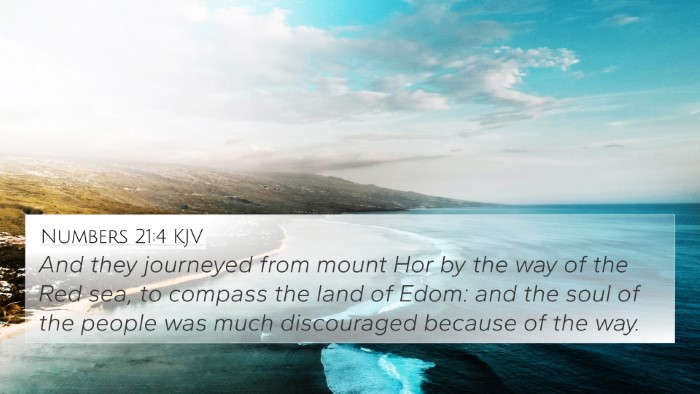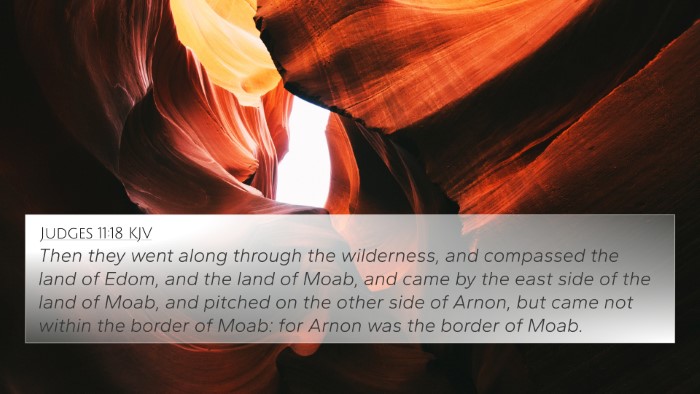Understanding Deuteronomy 2:1
Bible Verse: Deuteronomy 2:1
Deuteronomy 2:1 states: "Then we turned and took our journey into the wilderness by the way of the Red sea, as the Lord spake unto me: and we compassed mount Seir many days." This verse marks a significant moment in the Israelites' journey through the wilderness, and it represents both a physical and spiritual lesson.
Key Themes
- Obedience to God's Direction: The phrase "as the Lord spake unto me" emphasizes the importance of following divine guidance.
- Maneuvering through Trials: The wilderness journey illustrates enduring challenges, a common theme in the experience of the faithful.
- Divine Providence: The reference to turning back reveals God's hand in the Israelites' circumstances, reflecting His control over their path.
- Time of Preparation: The mention of "compassed mount Seir many days" indicates a period of preparation and perhaps the need to learn patience and reliance on God.
Insights from Commentaries
Matthew Henry: Henry highlights that this passage shows God's instruction to the Israelites as they wander, emphasizing their need to depend on His guidance. He interprets this turning back not as a defeat but as a strategic movement orchestrated by God for their spiritual growth.
Albert Barnes: Barnes notes that the wilderness is not only a literal place but also a metaphor for the testing and trials believers endure. He stresses the significance of their experiences in the wilderness as essential to forming their identity as a covenant people.
Adam Clarke: Clarke focuses on the geographic and historical context, explaining that the Israelite's route around Mount Seir exemplified their path of obedience despite the challenges they faced. He points out that their journey through less desirable paths allowed them to avoid conflict and prepare for entering the Promised Land.
Biblical Cross-References
Deuteronomy 2:1 connects with several other scriptures, which help deepen our understanding of this verse. Here are 7-10 Bible cross-references that relate to the themes in Deuteronomy 2:1:
- Exodus 14:15-16: God's instructions to Moses as the Israelites approach the Red Sea highlight divine guidance.
- Numbers 14:29-30: God's promise of entering the land reflects His faithfulness despite the wandering.
- Deuteronomy 1:41-45: Israel's failure to trust God and the subsequent consequence of wandering further emphasizes reliance on God
- Psalm 107:4-7: The theme of wandering in the wilderness aligns with God's leading and deliverance for His people.
- Isaiah 40:3: A call for preparedness connects with the notion of navigating through wilderness experiences.
- Matthew 4:1: Jesus' temptation in the wilderness mirrors the trials faced by the Israelites.
- Romans 15:4: The Old Testament's lessons are for our learning, linking the Deuteronomy experience to New Covenant teachings.
- Hebrews 11:8-10: The faith journey of Abraham correlates with the journey of the Israelites, focusing on promises not fully realized.
- Galatians 4:24: Paul’s allegorical interpretation of Hagar and Sarah sheds light on the theme of spiritual lineage and obedience.
Thematic Connections
This exploration of Deuteronomy 2:1 allows for connections between various Bible verses, highlighting key themes such as:
- Faith under Trial: How believers respond in adversity (see 1 Peter 1:7).
- God's Guidance: Trusting in His leading during uncertain times (see Proverbs 3:5-6).
- Preparation for God’s Promises: The importance of enduring testing before receiving God's blessings (see James 1:2-4).
Conclusion
In summary, Deuteronomy 2:1 invites us to reflect on our dependence on God as we navigate life's wildernesses. By analyzing this verse along with related scriptures, we see a rich tapestry of God's faithfulness, guidance, and the necessary preparation process for entering into His promises. Tools for Bible cross-referencing can enhance our understanding of these themes, leading us into deeper study and insight.
Further Study Suggestions
If you're interested in further exploring cross-references related to Deuteronomy 2:1 and similar themes, consider utilizing a Bible concordance or a Bible cross-reference guide. You can also explore methods for cross-referencing Bible study to identify thematic connections through scripture that aid in understanding the larger narrative of the Bible.







